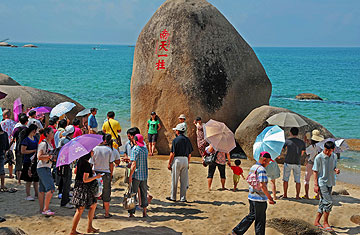
Tourists at the seaside in the Chinese city of Sanya, Hainan province, on May 1, 2011
If you have any plans to travel to China, you should get a move on, because it's getting more expensive every day to be a tourist in the Middle Kingdom. Chinese media last week reported that some of the country's most famous tourist sites are prepping major ticket-price hikes as part of a three-year government-led price review. Tickets for Taierzhuang, the site of a 1938 military victory over Japan, are set to jump by 60% to $25. As recently as 2008, admission to the battle site was completely free. The changes have rankled Chinese tourists, who are becoming increasingly vocal about what they call a rip-off culture in the industry.
Domestic tourism has taken off in China in recent years, as disposable income levels have risen dramatically. According to the China Tourism Academy, Chinese tourists took a collective 2.6 billion trips in 2011. Along the way, most domestic travelers have grown accustomed to some level of price gouging. Being dragged for hours through the gift shop at the local jade factory, or being forced to admire endless strings of pearls, is wearingly common for tour groups. But many now worry that the gouging is getting worse — and they are taking to the Internet to fight back.
One disgruntled traveler, Luo Di, created a media storm earlier this year when he posted a story on his Sina Weibo microblog about a friend's holiday experience on the island of Hainan. At an ordinary seaside restaurant, the friend had enjoyed a simple three-course seafood meal. The bill came to more than $600 — a small fortune in this relatively poor region of the country. Luo's tale quickly went viral as many other Weibo users chimed in with their own experience of being fleeced while on holiday in China. One Weibo user, using the name Heirenguanghui, posted a receipt showing a seven-course seafood meal that cost $1,500.
According to domestic tour agents, the cost of domestic travel is indeed rising rapidly. "This Chinese New Year, tour-package prices went up by 15% to 20%," said Xu Xin, manager of the domestic-tourism department at the Beijing headquarters of China Travel Service, one of China's leading tourist agencies. "This is very unusual for this time of year — normally prices stay stable from year to year, but this year we've seen the cost of transportation, hotels and tickets for places of interest rising significantly across the country."
More than 14 million tourists each year flock to the frigid northern city of Harbin for the annual Ice Festival, one of China's most popular winter tourist attractions. Visitors endure Siberian weather conditions to see its renowned ice-and-snow sculptures, contributing an estimated $1.4 billion to the local economy, according to provincial authorities. But a trip to the festival does not come cheap. Tickets for Ice World, a 60-hectare (150 acre) ice-sculpture park and the festival's most famous destination, cost almost $50 each — nearly twice as much as the entrance fee to Rome's Colosseum and almost two-thirds of an entrance ticket to Disney World in Florida. On a recent family visit to Harbin, this reporter spent close to $200 per person on local transport and tickets to the Ice Festival's top three spots. Add in accommodation and food, and the total outlay for the three-person trip came to almost $800. By comparison, the average monthly income in Harbin is less than $300, according to the National Bureau of Statistics.
While many of China's emerging tourist class are relatively new to the game, experienced travelers who have spent some time overseas are often disappointed by the travel options at home. "The domestic tourist market is just too unstandardized, especially when you compare it to the international market," says Fan Di, a well-traveled young Beijing woman who spends one or two months every year on the road. "You can't trust anybody but yourself when you travel here, you can only depend on yourself and your own judgment or else you get ripped off." Fan spends most of her holiday time outside China, having recently returned from a trip to Burma. "I just don't go to the famous attractions in China; it's never worth it," she says.
Despite tourist grumbles growing louder, change may be slow in coming. When Luo's story first emerged, Hainan officials at first bristled at the accusation. An official with the local government quoted by local media strenuously denied that any tourists had ever been ripped off on the island and promised to take legal action against any "malicious attackers" who made claims to the contrary. Within 24 hours, however, local authorities were forced into an embarrassing reversal. Deluged with complaints of overcharging from thousands of disgruntled tourists who reported similar experiences to that of Luo's friend, the authorities issued a fine of nearly $80,000 to the restaurant involved and announced a "zero-tolerance policy" toward local businesses that ripped off tourists. Said Lu Zhiyuan, director of the Hainan Tourism Development Committee: "We will not let one rotten apple ruin the whole barrel."
